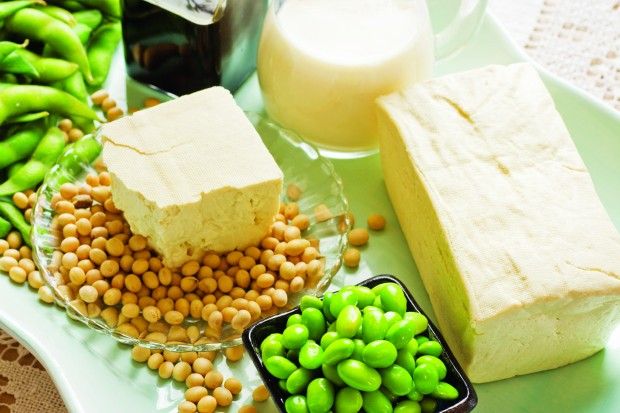Ganeden’s BC30 Probiotic Aids Plant Protein Digestion, Study Suggests
The in vitro study found that the presence of BC30 both increased protein digestion uptake in the upper gastrointestinal tract and promoted a healthier environment in the colon.
Photo © iStockphoto.com/Diane Labombarbe

Probiotic supplier Ganeden Biotech Inc. (Cleveland) is ramping up its research on how its flagship Bacillus coagulans probiotic strain GanedenBC30 can enhance the absorption of protein. Last year, the company announced a new study indicating that GanedenBC30, when taken together with dairy protein casein, was more effective than casein alone at reducing muscle damage following exercise. Earlier company data had suggested that GanedenBC30 may help the body better absorb protein. Now, the company has announced a new study finding that GanedenBC30 may also enhance the absorption of plant protein.
Alternative sources of protein are more popular than ever, but plant proteins are known to have lower digestibility than animal proteins. In a study published in Beneficial Microbes,1 researchers sought to determine whether GanedenBC30 has the potential to aid in the digestion of plant-based proteins. The in vitro study found that the presence of BC30 both increased plant-protein digestion uptake in the upper gastrointestinal tract and promoted a healthier environment in the colon by reducing the amount of excess undigested protein in the colon. According to the study authors, BC30 is the only Bacillus coagulans strain that has been shown to have an effect on protein utilization.
Researchers used three plant proteins-pea, soy, and rice-to test the potential benefits of BC30 in an in vitro model of the stomach and small intestine. They note that the experiment was carried out under the “average physiological conditions as found in the human gastrointestinal tract for adults,” and average concentrations of electrolytes, enzymes, bile, and pancreatic juice were adjusted accordingly. In addition, the researchers simulated pancreatic output by secreting 10% pancreatin in a small intestinal electrolyte solution. The models that did not receive BC30 served as the control.
To create the test meals, researchers mixed 15 g of each plant protein with 45 mg of a saliva-electrolyte solution. They then added the gastric residue. Over a period of six hours, researchers collected samples from the jejunal, ileal dialysate, ileal efflux, and from the secretion fluids. They measured concentrations of a-amino nitrogen and total nitrogen using a Cobas Mira Plus autoanalyzer and a Biuret assay, respectively. As the researchers explain, the amount of -amino nitrogen present following in vitro “digestion” is used as a proxy indicator of the hydrolysis of free amino acids and short peptides, which overall indicates the degree of digestion that has taken place. As the study authors explain, the ratio of total nitrogen to a-amino nitrogen reflects the degree of protein digestion. A lower ratio, the researchers say, indicates a higher degree of digestion.
According to researchers, BC30 increased protein digestibility of all three plant proteins, with digestion increases highest for soy protein, followed by pea and then rice protein. The researchers did point out that these results are not necessarily indicative of the quality of the digested proteins. In addition, they noted, “The ratio of TN/AAN indicated that for pea protein digestion was increased by BC30, but the degree of polymerization of the liberated small peptides and free amino acids was not changed. For soy and rice, however, BC30 showed a two-fold reduction in the TN/AAN ratio, indicating that the liberated digestion products formed during digestion in the presence of BC30 were shorter peptides and more free amino acids, than those liberated in the absence of BC30.”
The researchers suggest that BC30 can help the body in other ways related to protein digestion, too, besides simply improving amino acid bioavailability and uptake thanks to improved digestion. By improving protein digestion, BC30 has a secondary benefit of supporting colon health, they said. Excess protein that is not digested often reaches the colon, the study authors note, which can may be incorporated into the gut microbiota, or be fermented into toxic metabolites by the gut microbiota. Given that BC30 was shown in the current study to improve digestibility of all three plant protein sources, researchers concluded that “Thus, the enhanced protein digestion by BC30 showed a dual benefit: enhanced amino acid bioavailability from plant proteins in the upper GI tract, and a healthier environment in the colon,” they wrote.
“Consumers want multifunctional foods and beverages with ingredients that provide a variety of health benefits,” said David Keller, vice president of scientific operations, Ganeden, in a press release. “Using a probiotic strain like GanedenBC30 that supports the function of other ingredients is a win for both manufacturers and consumers.”
Also read:
Ganeden BC30 Supports Digestion, Immune Health in Seniors?
Ganeden Locks Down Bacillus Coagulans Probiotics in Coffee, Tea, and Cereal in the U.S.
Ganeden's New Staimune Immune-Health Ingredient is "Probiotic Derived," But It Is Not a Probiotic
References:
- Keller, D et al. “Bacillus coagulans GBI-30, 6086 increases plant protein digestions in a dynamic, computer-controlled in vitro model of the small intestine (TIM-1).” Beneficial Microbes, vol. 3, no. 3 (2017): 491-496






